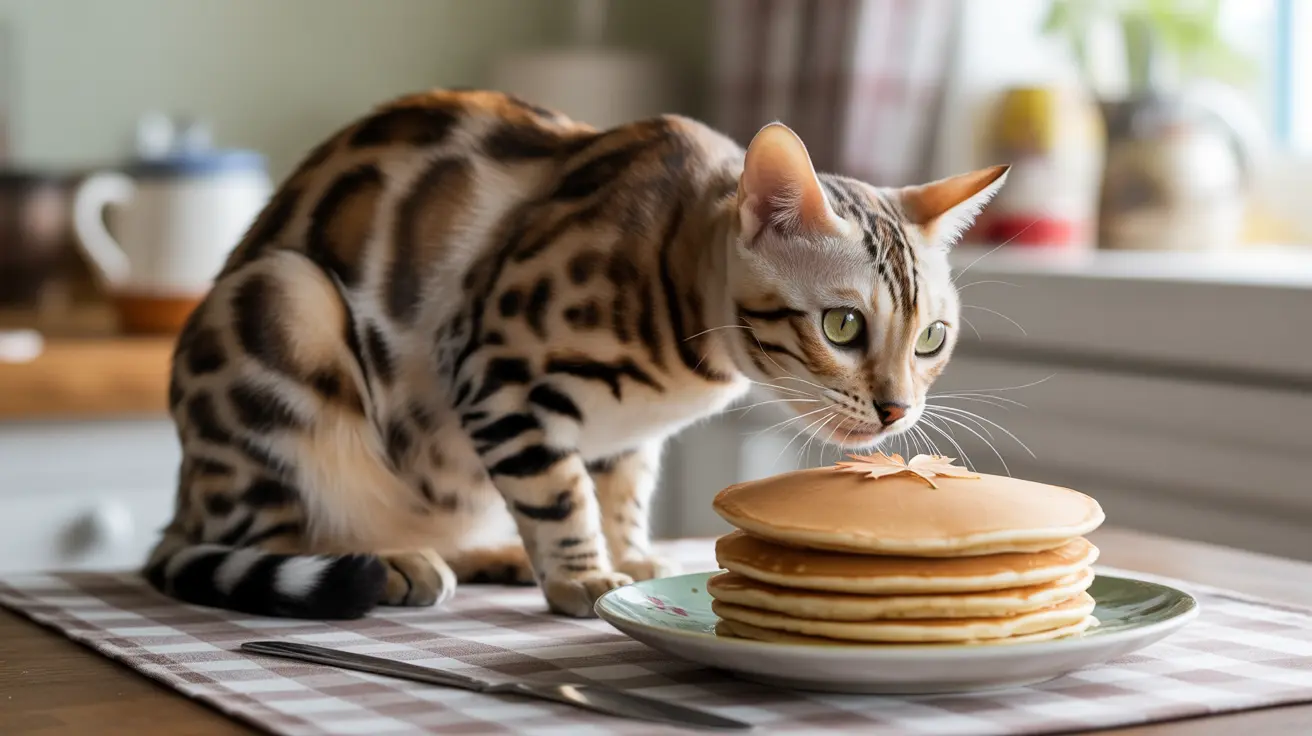Many cat owners wonder about sharing their breakfast favorites with their feline friends. While the smell of freshly made pancakes might attract your curious cat, it's essential to understand whether these sweet treats are safe for feline consumption. This comprehensive guide will explore everything you need to know about cats and pancakes, including potential risks, safe alternatives, and expert recommendations.
Understanding the Basics: Are Pancakes Safe for Cats?
Plain pancakes aren't inherently toxic to cats, but they're far from an ideal treat for your feline friend. Standard pancake ingredients like flour, eggs, milk, and butter can cause various digestive issues in cats. While a tiny bite of plain pancake likely won't cause serious harm, regular consumption can lead to significant health problems.
Cats are obligate carnivores, meaning their bodies are designed to process and utilize nutrients from animal-based proteins. The high carbohydrate content and dairy ingredients in pancakes don't align with their natural dietary needs.
The Hidden Dangers of Pancake Ingredients
Dairy Components
Most adult cats are lactose intolerant, making the milk and butter in pancakes potentially problematic. These ingredients can cause diarrhea, vomiting, and stomach upset.
Flour and Carbohydrates
Cats have no biological need for carbohydrates in their diet. The wheat flour in pancakes can lead to weight gain and may trigger allergic reactions in sensitive cats.
Sugar and Salt
The added sugars and salt in pancake batter can disrupt your cat's digestive system and contribute to obesity and diabetes when consumed regularly.
Pancake Toppings: A Serious Health Risk
Common pancake toppings pose even greater risks than the pancake itself:
- Chocolate syrup (toxic to cats)
- Maple syrup (high sugar content)
- Artificial sweeteners (especially xylitol, which is lethal)
- Nuts (potential choking hazard)
- Whipped cream (dairy intolerance)
- Raisins or grapes (toxic to cats)
Healthier Alternatives for Your Cat
Instead of sharing pancakes with your cat, consider these feline-friendly options:
- Small pieces of cooked, plain chicken
- Tiny bits of cooked fish
- Commercial cat treats formulated for feline nutrition
- Veterinarian-approved protein-based snacks
When to Contact Your Veterinarian
If your cat has consumed pancakes or toppings, watch for these warning signs:
- Vomiting or diarrhea
- Lethargy
- Loss of appetite
- Unusual behavior
- Signs of distress
Frequently Asked Questions
Can cats safely eat pancakes, and what are the risks involved?
While cats can technically eat plain pancakes in very small amounts, they're not safe as a regular treat. Risks include digestive issues, weight gain, and potential allergic reactions to ingredients.
What ingredients in pancakes are harmful or toxic to cats?
Common harmful ingredients include dairy products (milk, butter), artificial sweeteners, chocolate, and certain toppings like raisins or nuts. These can cause various health issues ranging from mild stomach upset to severe poisoning.
How much pancake is safe to give a cat without causing digestive issues?
If you must share, limit it to a tiny bite-sized piece of plain pancake (about the size of a cat kibble) without any toppings. However, it's best to avoid feeding pancakes altogether.
Are there any cat-friendly pancake recipes or alternatives I can make at home?
Instead of traditional pancakes, consider making protein-based treats using cat-safe ingredients like plain cooked chicken or fish. Always consult your veterinarian before introducing new foods.
What signs should I watch for if my cat eats pancakes or pancake toppings?
Monitor for signs of digestive upset including vomiting, diarrhea, lethargy, or changes in appetite. If your cat consumes toxic toppings like chocolate or xylitol, seek immediate veterinary care.
Conclusion
While sharing food with our pets can be tempting, it's crucial to prioritize their health and dietary needs. Instead of offering pancakes to your cat, stick to a balanced, species-appropriate diet and veterinarian-approved treats. This approach will help ensure your feline friend stays healthy and happy for years to come.






